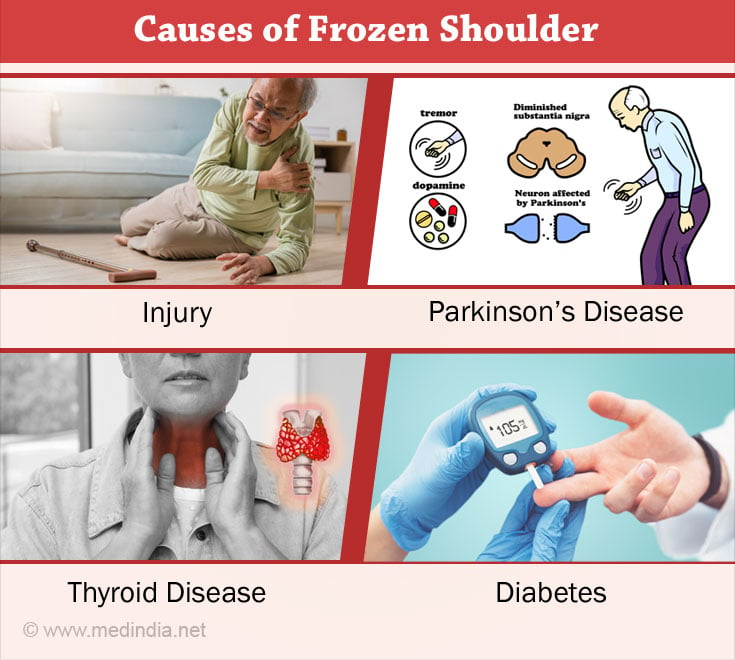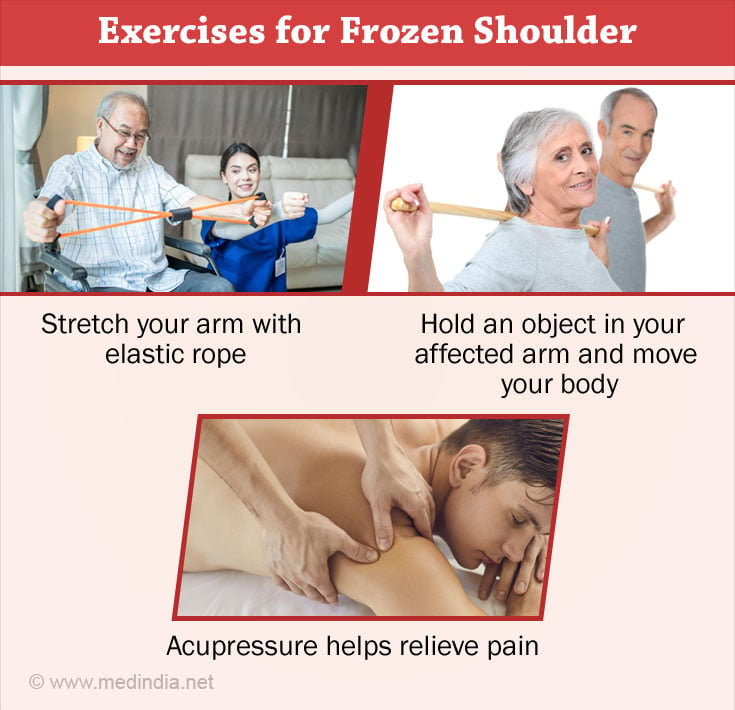- Frozen Shoulder. - (https://www.ncbi.nlm.nih.gov/books/NBK482162/)
- Frozen shoulder and risk of cancer: A Population-based Cohort Study. - (https://www.ncbi.nlm.nih.gov/pmc/articles/PMC5520209/)
- Shoulder disorders and occupation. - (https://www.ncbi.nlm.nih.gov/pmc/articles/PMC4836557/)
- Shoulder manifestations of diabetes mellitus. - (https://pubmed.ncbi.nlm.nih.gov/20701586/)
- Frozen shoulder: overview of clinical presentation and review of the current evidence base for management strategies. - (https://www.ncbi.nlm.nih.gov/pmc/articles/PMC7720362/#)
- Treatment Strategy for Frozen Shoulder. - (https://www.ncbi.nlm.nih.gov/pmc/articles/PMC6695331/)
- MRI findings for frozen shoulder evaluation: is the thickness of the coracohumeral ligament a valuable diagnostic tool - (https://www.ncbi.nlm.nih.gov/pmc/articles/PMC3233594/)
- Acute postoperative pain after arthroscopic rotator cuff surgery: A review of methods of pain assessment. - (https://www.ncbi.nlm.nih.gov/pmc/articles/PMC6250077/)
- Wearable long duration ultrasound therapy pilot study in rotator cuff tendinopathy. - (https://www.ncbi.nlm.nih.gov/pmc/articles/PMC8248905/)
- Two-year follow-up of low-level laser therapy for elderly with painful adhesive capsulitis of the shoulder. - (https://www.ncbi.nlm.nih.gov/pmc/articles/PMC4448931/)
- Causes of Shoulder Dysfunction in Diabetic Patients: A Review of Literature. - (https://www.ncbi.nlm.nih.gov/pmc/articles/PMC9140829/)
- Treating Vitamin D Deficiency and Insufficiency in Chronic Neck and Back Pain and Muscle Spasm: A Case Series. - (https://www.ncbi.nlm.nih.gov/pmc/articles/PMC6730953/)
- Physical therapy in the management of frozen shoulder. - (https://www.ncbi.nlm.nih.gov/pmc/articles/PMC5917053/)
- Investigation of the Effectiveness of Acupuncture in the Treatment of Frozen Shoulder. - (https://www.ncbi.nlm.nih.gov/pmc/articles/PMC5034968/)
What is Frozen Shoulder?
A frozen shoulder means your shoulder is painful and stiff for months, sometimes years. It can be treated with shoulder exercises and painkillers.
What Happens in Frozen Shoulder?
In Frozen Shoulder the tissue around the shoulder region becomes inflamed causing the tissue to become tight and shrunk due to formation of scar tissues leading to pain and difficulty in movement. This condition is also termed as 'adhesive capsulitis' and is characterized by a gradual increase in symptoms, which become worse over time, subsiding in two to three years in most instances(1✔ ✔Trusted Source
Frozen Shoulder.
Go to source).
What Causes Frozen Shoulder?
- The real cause of frozen shoulder is not known but it can occur as a complication after surgeries like mastectomy and open heart surgery(2✔ ✔Trusted Source
Frozen shoulder and risk of cancer: A Population-based Cohort Study.
Go to source). - It can occur as a complication after Stroke.
- It can develop due to a severe injury in the shoulder area.
- Sometimes it can also occur due to consistent
high blood sugar levels(3✔ ✔Trusted Source
Shoulder manifestations of diabetes mellitus.
Go to source) - Other causes includes :
- Dupuytren disease
- Parkinson's disease
- Tuberculosis
- Hyperthyroidism
- Hypothyroidism
- Closed head trauma
- Overuse of the shoulder

Which Age Group is Commonly Affected with Frozen Shoulder?
Frozen shoulder usually occurs in people in their 40s or 60s, with greater prevalence among women(4✔ ✔Trusted Source
Frozen shoulder: overview of clinical presentation and review of the current evidence base for management strategies.
Go to source).
Frozen shoulder usually never affects the same shoulder again but the other shoulder could be affected with a frozen shoulder if the condition determines it.
What are the Symptoms and Signs of Frozen Shoulder?
Symptoms and signs includes:
- Extreme pain in the shoulder region that is more pronounced in night and in colder climates.
- Pain in your shoulder any time you try to move it.
- Stiffness that makes it difficult to move your shoulder.
- Pain in the upper arm.
- Unable to sleep on the side with shoulder pain.
- Difficulty sleeping.
What are the Stages of Frozen Shoulder?
The symptoms of a frozen shoulder develop very gradually and they normally go through the following 3 phases(5✔ ✔Trusted Source
Treatment Strategy for Frozen Shoulder.
Go to source):
Inflammatory Phase:
This phase is also called the freezing phase where the patient senses pain, when the arm is not in use, and then slowly even when in use This phase may last anywhere between 3 to 9 months and the patient witnesses a steady increase in pain and a growing 'freezing' or stiffness of the shoulder(5✔ ✔Trusted Source
Treatment Strategy for Frozen Shoulder.
Go to source).Frozen Phase:
During this phase, there is a slow let up in the pain when the shoulder is at rest. However, the stiffness and pain when in movement remain. The entire phase lasts anywhere between 4 to 12 months(5✔ ✔Trusted Source
Treatment Strategy for Frozen Shoulder.
Go to source).Thawing Phase:
Once in this phase, the patient notices a gradual reduction in pain and returns to mobility of the shoulder. It may take anywhere between 3 months to 2 to 3 years for normalcy to set in(5✔ ✔Trusted Source
Treatment Strategy for Frozen Shoulder.
Go to source).
How to Diagnose a Frozen Shoulder?
Diagnosis is largely made by physical examination and by assessing the history of the condition.
Diagnostic tools used:
X-Ray:
It helps in diagnosing the disease. Xray can also differentiate between conditions like Arthritis, Chronic rotator cuff tear, Calcific tendonitis that have similar symptoms as frozen shoulder.MRI Scans:
They are rarely used for diagnosis of frozen shoulder(6✔ ✔Trusted Source
MRI findings for frozen shoulder evaluation: is the thickness of the coracohumeral ligament a valuable diagnostic tool
Go to source)
What are the Diseases that can have Symptoms Similar to Frozen Shoulder?
The patient will find it painful to undergo the strength test and there are chances of a misdiagnosis with the following(7✔ ✔Trusted Source
Shoulder disorders and occupation.
Go to source):
- Impingement syndrome
- Tendonitis
- Rotator cuff syndrome
- Bursitis
How do you Treat a Frozen Shoulder?
Most often, a frozen shoulder resolves by itself in a matter of 3 years.In certain cases following treatment plans:
Non-surgical methods of treatment
- Stretching exercises guided by a physiotherapist (5✔ ✔Trusted Source
Treatment Strategy for Frozen Shoulder.
Go to source) - Medication that reduces inflammation
- Oral cortisone
- Corticosteroid injections
- A healthy diet which is low in carbohydrates
- Use of ice to reduce pain and swelling
- Intake of antioxidants
Surgical Methods of Treatment
When do I need surgery for frozen shoulder?
When non-surgical methods does not help in improving the patient's condition, then the surgical methods are advised to the patient.
What type of surgery is performed for Frozen shoulder?
Arthroscopic Capsular release surgery is performed to help with frozen shoulder. It is a surgical method that involves the use of shoulder arthroscopy capsular release under anaesthesia. This medical procedure is performed to remove scar tissue and to cut tight ligaments, aiding in better movement of the shoulder. After the surgery, ainkillers are provided which will help continue physical therapy(6✔ ✔Trusted Source
MRI findings for frozen shoulder evaluation: is the thickness of the coracohumeral ligament a valuable diagnostic tool
Go to source).
Are there any Complications for Arthroscopic Capsular Release Surgery Performed for Frozen Shoulder?
- When the shoulder is moved with increased force during surgery, it could lead to arm breaking
- The pain and stiffness may not recede even after surgery(8✔ ✔Trusted Source
Acute postoperative pain after arthroscopic rotator cuff surgery: A review of methods of pain assessment.
Go to source)
Latest Treatment Options for Frozen Shoulder
Wearable technology
Wearable technology is a device that is worn under clothes and provides ultrasound therapy for few hours daily. This has been found to provide immense relief from pain and improve mobility among patients.
It is similar to insulin delivering device used by diabetic patients(9✔ ✔Trusted Source
Wearable long duration ultrasound therapy pilot study in rotator cuff tendinopathy.
Go to source).
This method of treatment is revolutionizing medicine and it is estimated that by the year 2025, wearable technology would come into common use.
Low-level laser therapy (LLL):
Low-level laser therapy uses Laser to treat frozen shoulder and has shown 90% improvement in treating frozen shoulder. The biggest advantage of this treatment is that it is pain free in nature, making it acceptable for even the older people(10✔ ✔Trusted Source
Two-year follow-up of low-level laser therapy for elderly with painful adhesive capsulitis of the shoulder.
Go to source).
What is the Prognosis for a Patient with Frozen Shoulder?
Frozen shoulder can resolve on itself within 2 years but with surgery and care, it can resolve within 1year.
How can you Prevent Frozen Shoulder?
These preventive steps can aid in minimizing the risk of frozen shoulder.
- Once the initial pain develops and before the stiffness fully sets in, consult a doctor for treatment options that could prevent immobility of the shoulder.
- Control systemic diseases like diabetes, which increase the risk for a frozen shoulder(11✔ ✔Trusted Source
Causes of Shoulder Dysfunction in Diabetic Patients: A Review of Literature.
Go to source). - Exercise the shoulder after surgical procedures that could immobilize shoulders and lead to a frozen shoulder.
- Practice a good pose while performing daily chores like using the computer. A bad hunch can affect the shoulder dynamics leading to stress that could increase the risk for a frozen shoulder.
- Reduce the intake of processed foods and include only minimally processed foods in your diet.
- Consult a doctor immediately if there has been an injury to the shoulder, especially during sports. Rest is one of the best options but carefully monitored exercises are also important to maintain mobility.
Vitamin D should be taken as a supplement(12✔ ✔Trusted Source
Treating Vitamin D Deficiency and Insufficiency in Chronic Neck and Back Pain and Muscle Spasm: A Case Series.
Go to source).
What are the Exercises that you can do for Frozen Shoulder?
Get the arm over your head while lying down:
Lie down flat on your back and using your 'good arm' hold the wrist of your arm affected with the frozen shoulder and gently ease it up over your head. Hold the position for a count of 10 and then gently bring it back down.
Get the arm over your head while sitting down:
Sit down in a chair and rest your affected arm on a table next to you. The table should be tall enough to reach your shoulder while you sit down. Place your affected arm outstretched in front of you and slowly bend your head down, as you do this, stretch your arm over your head.
Stretch your arm overhead with an elastic rope:
Tie an elastic, stretchable rope to a hook on the ceiling. Sit down in a chair below it. The rope should reach just above your head. Pull it down with your 'good' arm and then hold it with your affected arm. Gently raise the arm up with the tension created in the elastic rope. Repeat this exercise 10 times(13✔ ✔Trusted Source
Physical therapy in the management of frozen shoulder.
Go to source).
Hold a stationary object with your affected arm and move your body:
Hold a stationary pole or a door knob with your affected arm and then gently swing your body away and then move back in. Repeat this exercise 10 times(13✔ ✔Trusted Source
Physical therapy in the management of frozen shoulder.
Go to source).

Health Tips
- Avoid overstretching or excessive physical activity that could make your condition worse.
- Chinese plasters and certain liniments are believed to bring about pain relief.
- Acupressure is another alternative treatment method that is used to relieve pain(14✔ ✔Trusted Source
Investigation of the Effectiveness of Acupuncture in the Treatment of Frozen Shoulder.
Go to source).








